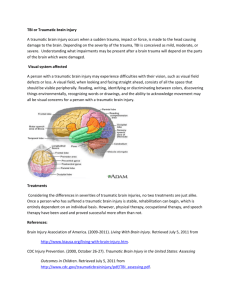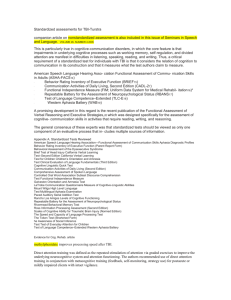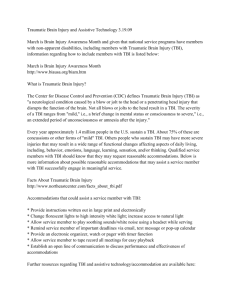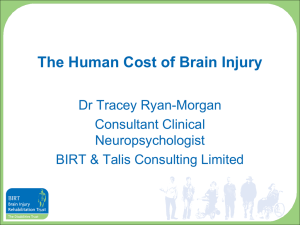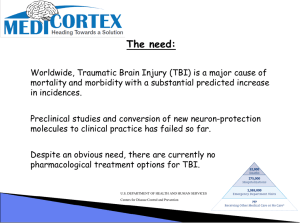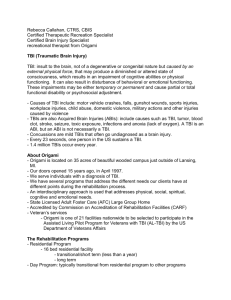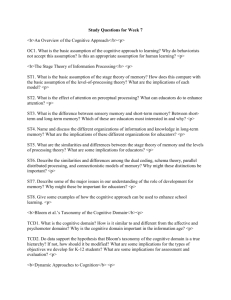In South Carolina, nearly 1000 secondary and post
advertisement
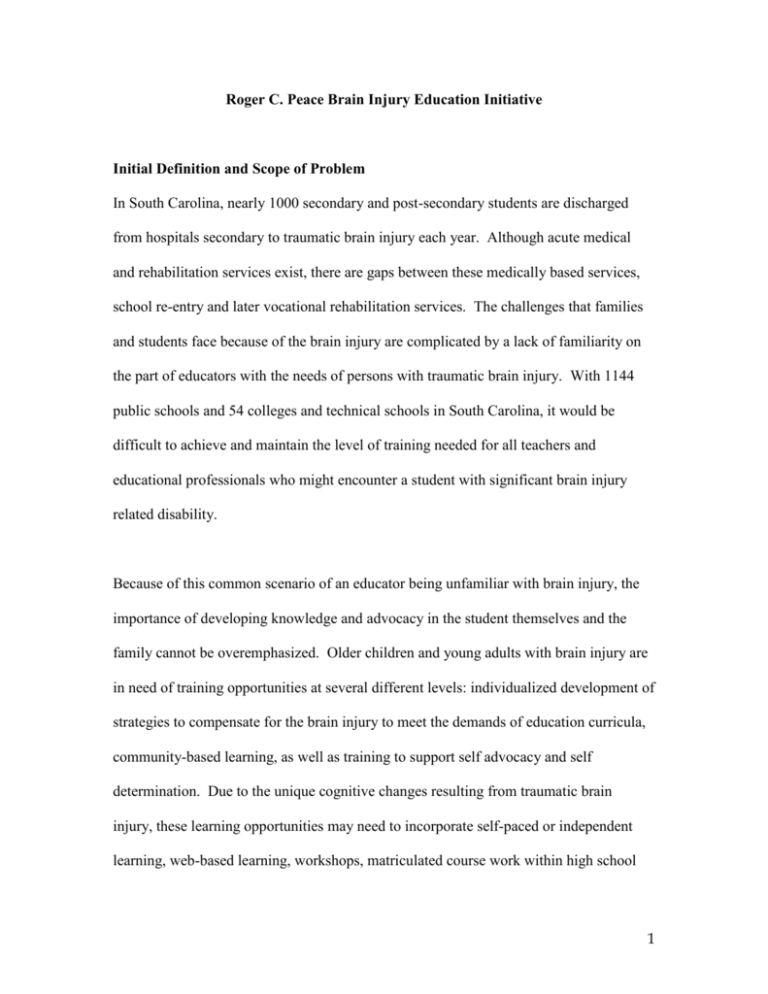
Roger C. Peace Brain Injury Education Initiative Initial Definition and Scope of Problem In South Carolina, nearly 1000 secondary and post-secondary students are discharged from hospitals secondary to traumatic brain injury each year. Although acute medical and rehabilitation services exist, there are gaps between these medically based services, school re-entry and later vocational rehabilitation services. The challenges that families and students face because of the brain injury are complicated by a lack of familiarity on the part of educators with the needs of persons with traumatic brain injury. With 1144 public schools and 54 colleges and technical schools in South Carolina, it would be difficult to achieve and maintain the level of training needed for all teachers and educational professionals who might encounter a student with significant brain injury related disability. Because of this common scenario of an educator being unfamiliar with brain injury, the importance of developing knowledge and advocacy in the student themselves and the family cannot be overemphasized. Older children and young adults with brain injury are in need of training opportunities at several different levels: individualized development of strategies to compensate for the brain injury to meet the demands of education curricula, community-based learning, as well as training to support self advocacy and self determination. Due to the unique cognitive changes resulting from traumatic brain injury, these learning opportunities may need to incorporate self-paced or independent learning, web-based learning, workshops, matriculated course work within high school 1 and community college, and alternative life-long learning (workshops, continuing education courses, etc). Families of persons with brain injury require general education about the effects of traumatic brain injury, but they also need assistance with longer range planning around issues related to secondary education, postsecondary education, and early career choices. Families also require mentoring in developing appropriate advocacy skills to support the realistic choices of their brain injured family members. Unfortunately, research shows that children and youth with TBI are referred for medical rehabilitation at a significantly lower rate than adults. It follows that these same children will then not be served in special education classrooms. However, if one counts the number of regular education classrooms in South Carolina versus the number of students with brain injury who return to them, the occurance of a teacher having a student with TBI in their classroom can be sporadic, making broad-based efforts to train these regular education teachers in specialized instructional strategies for complex cognitive needs inefficient. The resultant potential teacher training needs are sweeping yet will not be able to be addressed solely through traditional in-services and requires “just in time” resources through alternatives such as web-based learning. 2 Brain Injury Education Initiative The Brain Injury Education Initiative was developed in order to begin to address issues outlined above and to improve the effectiveness of school re-entry following traumatic brain injury. The initiative included: Additional training needs assessment in order to identify and develop a range of training options for educators and persons with brain injury and their families. A pilot study skills workshop for teens and teacher training courses. A TBI Education Roundtable was held for interested parties to express and exchange ideas around brain injury, provide additional input for the needs assessment as well as learn the results from the survey. Development of the web-based resource portal, the Brain Injury Navigator, (www.binav.org) which provides information about all aspects of brain injury and school issues, as well as South Carolina-specific resources with the material targeted specifically for educators, families and students. Training Needs Assessment The training needs assessment, both paper and web-based, was completed by regular and special education teachers, therapists, family members of persons with brain injury, as well as persons with brain injury. Over 130 surveys were returned from over 20 counties and/or school districts across South Carolina to provide a closer look at the strengths and weaknesses of the school integration process following brain injury. 3 The central theme from survey results suggests there is no systematic method for connecting children and their families with school systems; no common language exists between families, doctors, therapists, and teachers. Educator Perspective Educators were asked a variety of questions, including where they had received their brain injury education, and were given the opportunity to provide personal experiences and comments. Educators were quoted as asking for better collaboration, more communication, and a better understanding of the long term needs for those with brain injury. Important to also include is the number of educators, 25, who report being unfamiliar with or who have little to no experience with students with brain injury. Communication: Only 10.9% of educators felt like there was adequate communication between medical professionals and their school. A little over 50% report there is good communication between themselves and parents. 40% of teachers felt like information about a student with brain injury was begin passed along at the school level to auxiliary staff. Knowledge Base regarding brain injury: 44% of educators surveyed report they are comfortable with their TBI background. 41% thought they could treat, manage, and teach those students with brain injury. 4 Only 37% felt comfortable screening for brain injury for those students who were performing below expectations. Teacher Input: 77.1% asked to know more about classroom accommodations. 75.2% asked about cognitive deficits after TBI. 69.5% need assistance with behavior modification. Only 16% report that their school district provides educational opportunities around brain injury. Family Perspective In comparison, families were also given the same opportunity to provide feedback regarding their experiences with school reintegration. Information collected proved helpful; however additional information is warranted from across the state as most of the surveys returned came from the Roger C. Peace Rehabilitation Hospital’s system, where family education and advocacy is extremely important. Comments collected were mixed, however the need more systematic communication and brain injury education is overwhelming. 80% of parents felt as if they’d been given adequate information about brain injury for their child’s return to school. Over 85% report their student was equipped with study strategies or tools needed to be successful in the classroom. 63% of parents felt like there was good communication between medical professionals and the school system. 5 Only 44% felt as if the school was prepared for their child’s return into the classroom. Less than 20% of parents felt the educator’s demonstrated adequate knowledge about brain injury. Study Skills Workshop and Teacher Training To address the training needs in South Carolina, more traditional opportunities for brain injury education are being offered through the Brain Injury Education Initiative. While in a therapy or treatment program, students may learn compensatory strategies aimed at improving memory, attention, organization, and reasoning. Often however, study strategies are not always mastered, as a student may not have returned to school by the time their treatment program is over. As a result, a pilot study skills workshop for students with brain injury and their families was conducted to assess the feasibility of providing direct training in study skills in a mixed group format. Students learned note taking, time management and memory strategies while parents were given Parents and Educators as Partners, a workbook designed to help families with the school re-entry process. Feedback indicates that the workshop format was successful as all students surveyed strongly agreed that the material presented was useful and much needed. In addition, upcoming teacher training opportunities are scheduled this summer in conjunction with the SC Department of Education Office of Exceptional Children and the Brain Injury Alliance of SC. Both regular and special education teachers, school psychologists, and therapists will have the opportunity to learn basic brain injury 6 principals, screening and identification of students with brain injury, classroom modifications, IEP and 504 eligibility and accommodations, advocacy and behavior management. Both internet and library resources will be provided for ongoing education. TBI Education Roundtable Additional input from a TBI Education Roundtable was gathered to brainstorm ideas around communication logistics. 25 professionals from across South Carolina participated in and shared their thoughts regarding TBI and school reintegration. 12 individuals completed an online survey following the webinar. The audience overwhelmingly agreed that the goals addressed by the TBI Education Initiative were important to SC TBI and school re-entry. 9 people asked for additional networking opportunities, while 8 asked for the creation of education modules pertaining to brain injury and school re-entry. Several wanted to know what programs other states have to meet the needs of their brain injury population. In response, a meeting will be held at this year’s “Life with Brain Injury,” the SC state brain injury conference, to follow up on additional recommendations. Questions regarding family follow through, information breakdown, and coordinating adequate communication will be addressed and information used as part of developing goals for grant year 2. Brain Injury Navigator In response to the need for better communication, Brain Injury Navigator, a web-based information portal was developed to meet part of the existing communication and information gaps. The site contains educational resources aimed at providing up to date 7 information to educators, families and students regarding brain injury and school reentry. It allows interested parties more convenient and direct access to support materials and SC specific information. It has begun linking families and therapists together using the common social networking site, Facebook, and provides a calendar of brain injury education across the state. Teachers now have easier access to IEP goals, accommodations, and checklists when a student with brain injury enters their classroom. Links to reputable brain injury education sites can be found as well as basic TBI knowledge. Additional resources include advocacy training for parents, transitioning from high school to college or into the work force, and information on laws and eligibility. C6A3BI Program and Online Training Lastly, an assessment and review of the C6A3BI, Coastline Community College Comprehensive Cognitive-Retraining Curriculum for Adults and Adolescents with Acquired Brain Injury was completed for feasibility of piloting a similar program in SC. C6A3BI was designed as part of a $219,000 grant in 1994 awarded by the U.S. Department of Education’s Fund for the Improvement of Postsecondary Education for use at the secondary and postsecondary levels in the re-education of teenagers and adults who sustained traumatic brain injuries. The end result was a comprehensive resource aimed at cognitive retraining, application and generalization those cognitive skills, and processing of psychosocial issues. The curriculum emphasizes critical thinking skills, application of cognitive skills such as attention and memory, awareness of changes caused by brain injury, and enhancement of verbal and figural skills. Students enrolled 8 attend this program for an average of 2 years; attend classes 4 days a week, four 45 minute classes a day. Students are divided into 4 teams of 10-18 students based on assessment results; students with similar strengths and weaknesses. While C6A3BI serves as a great resource, the magnitude of this program is beyond our scope of the grant at present. However, further review of the C6A3BI revealed a smaller, more accessible component; an online cognitive boot camp suitable for piloting with 3-4 students. Potential students include brain injury survivors, caregivers, and professionals. Students will have the opportunity to complete 12-16 weeks of online learning. Class titles include A Guide to Brain Injury, Strategies for Using PDA’s, Cognitive Strategy Building and Community Re-Integration. This cognitive boot camp addresses the following topics: evaluation of cognitive skills, development of strategy building to compensate for cognitive difficulties, and psychosocial adjustment. This unique opportunity would allow for students with brain injury to learn about their own injuries, strengths and weaknesses as well as provide much needed ongoing TBI education. Summary of Conclusions The Brain Injury Education Initiative completes the first year with preliminary data supporting the impressions that traumatic brain injury is complex and broad training needs exist in South Carolina. Coordinated communication regarding school re-entry is a desire and steps to ensure this are needed. In addition, based on user feedback, the Brain Injury Navigator is a useful and effective tool beginning to provide that communication 9 and education. Based on these impressions, it is concluded that approval of grant year 2 is awarded. Goals, during the second year of the Brain Injury Education Initiative, include: Continued development and enhancement of the BI Navigator website Increasing website awareness through presentations at regional conferences to various professional groups such as school nurses, school-based speech-language pathologists, special and regular education teachers. Because not all materials are available on-line, partnerships with 4 regional public library systems (Piedmont, Midlands, PeeDee, and LowCountry) will be targeted to house a TBI Toolkit of resources for parents and educators. The needs assessment from year 1 indicated that teachers felt the need for additional training on traumatic brain injury, therefore an additional classroom workshop is planned. During year 2, the collaboration with the Coastline Community College online education program will be extended whereby students will complete the on-line training modules that are available for college credit. Information will be gathered from families, hospital personnel and educators regarding the hospital-to-school transition in order to identify best practices. Continued assessment and input is warranted given the limited scope of responses during year 1. Finally, formal and informal discussions around the communication needs of our families and educators will be ongoing through networking and training opportunities. 10 Because of the web-based information portal as well as regional library partnerships, the Brain Injury Education Initiative will have outreach to virtually any person across the state that requires education about the effects of a traumatic brain injury and statespecific resources. All of these goals above will result in a better understanding of brain injury and school re-entry for South Carolina students, families, and educators. Future Trends Through attendance and networking at NABIS, the North American Brain Injury Society, and after extensive review of the literature by authors such as Ann Glang, PhD, Research Scientist at the Oregon Center for Applied Science, potential needs were identified. Recommendations include looking at opportunities to collaborate, assist, and develop statewide, integrated TBI resource teams modeled after other states such as Pennsylvania’s BrainSTEPS (Strategies Teaching Educators, Parents, and Students), Tennessee’s Project BRAIN, and Oregon’s STEP model (Student Transition and reEntry program). These programs provide regional liaisons, school staff training, and consultations to educators working with students with TBI. Educational professionals, medical rehabilitation professionals and family members comprise these teams who work together to provide brain injury information and to improve the communication link between hospitals, families, and schools. Here in South Carolina, both Greenville and Charleston Counties have developed TBI teams comprised of therapists who hold their Certified Brain Injury Specialist Certificates and work in the schools. Ongoing development of these teams statewide and/or development of a communication tool(s) are recommended as more and more students with brain injury re-enter our classrooms. 11 Disguised as a low incidence disability, brain injury is occurring and systematic change in service delivery is crucial to meet the needs of our students. 12
